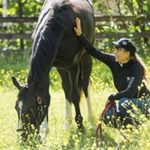Horses are highly sensitive to energetic changes in their environment and even to the energy of their fellow humans. For this reason, homeopathy can be a great tool to help them through acute and chronic situations.
There are many misconceptions about homeopathy – what it is and how it works. So let’s unpack homeopathy for horses today!
A Little Bit of History
Homeopathic medicine originated over 200 years ago. It was discovered by a German physician, Samuel Hahnemann, in the early 19th century. He observed that quinine, which was commonly used to treat various disease states in his time, would produce a symptom picture that was similar to the disease it was meant to cure when given in excess. He discovered that, through a process of dilution and agitation of quinine and other natural substances, he could influence disease states in a much gentler way.
The phrase “like cures like” became his mantra for homeopathic medicine. The premise being that substances that induce a disease state in “toxic” amounts will cure the same disease picture in highly diluted and non-toxic doses. The conventional apothecaries at the time were so resistant to his methods that he left Germany in 1821 and moved to France where he practiced medicine with a great following until his death.
What is Homeopathy?
Homeopathy is well-recognized in European cultures and several other cultures around the world including India, Africa, South and Central America, and Cuba. It has had a resurgence in popularity in the 21st century due to public demand. Some veterinarians are finding it to be a wonderful and non-suppressive tool in their practices and we hear success stories about it frequently here at Adored Beast.
Julie Anne Lee, the Adored Beast founder had an almost entirely homeopathic veterinary practice which saw over 40,000 cases over the 15 years it was operational. The number of miraculous case studies numbered in the hundreds, if not the thousands. I had the great opportunity of learning to practice in this setting with her and saw the power of homeopathic and natural medicine for myself. I had to know more so I went to school and became a homeopath too.
Homeopathic remedies may be so effective in small amounts due to the dilution process which involves using water and agitation of the solution, repeated hundreds or thousands of times.
Homeopathy is a 100% green medicine that has no negative impacts on the planet. It is also extremely inexpensive and has no suppressive side effects. It is an energetic medicine that uses frequency instead of crude substance as the vehicle of healing. Homeopathy is safe for the young and the old and can be used safely in relation to other modalities. Each remedy employs a unique energetic frequency to stimulate the body’s immune system, to encourage a return to homeostasis. It does not cover up symptoms of disease.
And now, back to horses! Let’s talk about how you can practically use homeopathy for horses and what remedies are must-haves in your barn first-aid kit.
Acute vs. Chronic Cases
Before we discuss your homeopathy for horses and what should be in your first-aid kit, it’s a good time to define the difference between chronic and acute cases.
- Chronic cases are long-term disease processes such as allergies, arthritis, auto-immune diseases, and cancer. These diseases should be addressed by both a veterinarian along with a fully trained homeopathic practitioner. You should not attempt to treat these conditions on your own.
- Acute cases include things like sprains and strains, minor traumas (bumps and bruises), mild to moderate GI upset, abscesses, and hives.
The nature of the conditions we will cover in this article are those with a sudden onset and that are non-life threatening. If you feel your horse needs medical assistance for any of the above, do not hesitate to call your veterinarian. These are just extra tools to have in the toolbox that may help to alleviate the situation, even if medical assistance is required. Homeopathic remedies are safe to give even prior to medications such as those used for pain relief, infection and inflammation.
Now, let’s get to it!
Homeopathy for Horses
Homeopathic remedies often come as small, round, white pellets about the size of peppercorns. To administer effectively to your horse, it’s best to give them orally or on a small piece of apple if that is less stressful. For single remedies, you can crush 2 pellets between 2 spoons until it is a powder and place onto the gums. If you are using multiple remedies at one time, or even just one, you can also dissolve 4 pellets in ¼ cup of filtered water and give 1 tbsp of the liquid as one amount given. This applies to all homeopathic remedies below.
Trauma
For instances of trauma, homeopathy for horses can be invaluable. All horse people are well-aware of how good horses are at bonking themselves! Have the following on hand for bumps and bruising:
- Arnica Montana: Probably the most famous and frequently used plant-based homeopathic remedy on the planet. It is a wonderful remedy for bruising and swelling and can also be used following dental extractions and surgical procedures to reduce inflammation and promote speedy recovery. The animal in this situation will often have the mental picture of stoicism, even if it seems to be painful. Think of the survival mode of behaviour – “I’m fine! Nothing to see here!”
- Aconite Napellus: Aconite is another wonderful remedy for trauma and bruising and has a similar symptom picture to arnica. The defining factor with this remedy is that the animal will often be frantic or restless or in “flight mode.” They externally present as stressed out!
- Bellis Perennis: This remedy is indicated for pain, bruising, swelling, stiffness, and coldness of the affected areas, especially if arnica is not helping. It is also a wonderful post-surgical remedy where bruising occurs.
Potency and dosing frequency for all of the above remedies:
Give a 200C or 1M potency every 15-30 minutes, 4-6 times, then every hour or as often as needed for up to 10 days.
Sprains and Strains
Joint and ligament sprains and strains are another common occurrence among horses, especially those doing performance work. Have these remedies on hand for such events and as preventative support before, during and after sporting events.
- Bryonia Alba: Use in instances of sprains where pain is worse from the slightest movement, from touch and from applying heat. It can also be used to alleviate pain caused by hoof abscesses where the horse does not want to bear weight.
- Rhus Toxicodendron: Use this remedy where sprains have pain that is worse from cold applications, better with movement and with heat.
- Ruta Graveolens: This remedy picture shows pain that is better from light movement but worse from over-exertion.
Potency and dosing frequency for all of the above remedies:
Can be followed by or concurrently given with arnica and aconite. Give in either 30C or 200C potency twice daily for up to 2 weeks.
Wounds and Punctures
- Calendula Officinalis: Wounds that are slow to heal. Promotes granulation of skin. Do not give in the event of deep cuts. Administer bellis perennis or staphysagria (see below) first! Then follow with calendula. Also useful for extremely itchy wounds with much irritation to the area.
- Staphysagria: Deep, painful wounds and post surgical wounds. Use arnica or aconite first and follow with staphysagria where wounds are red and sore but not infected.
- Ledum palustre: Puncture wounds (especially involving nails where tetanus is a concern) and insect bites (especially ticks).
Potency and dosing frequency for all of the above remedies:
All of the above remedies can be used following arnica or aconite. Use a 30C or 200C potency twice daily for up to 2 weeks. Call your veterinarian if the wound is serious, is not healing, or looks infected.
Hives
Hives are common with seasonal changes. It must be stated that immediate veterinary intervention is necessary if respiratory difficulty occurs with hives!
- Histaminum: Severe hives with sudden onset and itching.
- Apis mellifica: Extreme hives with an angry appearance and irritated mental state. Better from cool baths, worse from heat. Should be noted that if they are mentally worse from antihistamines, this is the remedy to think of.
- Urtica urens: Lumps/welts all over the body that are painful. Worse from bathing and touch (think of stinging nettle stings!).
Potency and dosing frequency for all of the above remedies:
Give 200C or 1M potency every hour until hives subside.
Extreme Stress
Emotional stress is a reality for horses when they move to a new home, have veterinary procedures or when they are travelling to horse shows. Think of the following for these situations:
- Aconite: Extreme anxiety/fear where the horse cannot settle and has extreme restlessness or frantic behaviour. Be safe and offer the remedy on some apple if this is the picture.
- Cocculus indicus: The trailer/travel remedy! If you have a horse with trailer anxiety, this will be your friend.
- Argentum nitricum: Horse show/performance stress, especially in the show arena.
Potency and dosing frequency for all of the above remedies:
Give 200C or 1M every 15-30 minutes, 4-8 times.
Colic
Let’s be clear and say that colic is often an emergency affair. That being said, there is always a waiting period before your vet arrives. Remedies can be administered in the meantime and after they visit, too. Think of the following for colic cases:
- Colocynthesis: Waves of cramping and contractive pain, restlessness, and worse from eating.
- Phosphorus: Colic during extreme weather changes, barometric pressure changes. Better moving, stressful changes, better from being touched or massaged.
- Nux Vomica: Impaction colic. Can help with gastric motility. Worse from too much food at one time, colic cases where infrequency of feeding is the suspected cause, sand colic, and in ponies and mini horses with small intestinal circumference.
Potency and dosing frequency for all of the above remedies:
If situation appears to require medical intervention, call the vet immediately and then administer remedies while you wait. Give 200C potency every 15 minutes until the vet arrives. You may continue the remedy for as long as is needed following a vet visit as well. Safe to use with veterinary colic medications.
Conclusion: Homeopathy for Horses
I hope this helps you to feel more prepared in first aid situations. Homeopathy for horses, for anyone really, can be a major boon in so many situations! It is simple to use, is not contraindicated with any other medications, and is safe for all.
Here’s to happy healthy horses!












